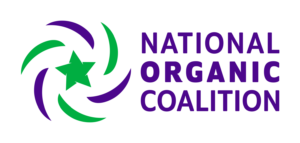When you see the USDA Organic label, what are your expectations? Do you trust that the product labelled was produced in a manner that is better for you, the planet, and the farmers that produced the product?
The intention of labeling systems, like “organic,” is to quickly communicate the standards the product met throughout its production. However, in order to ensure that the integrity of those standards meet your expectations, a complex network of organizations is needed. One such organization is the National Organic Coalition, NOC.

NOC is a national alliance of organic stakeholders working to provide a “Washington voice” to the organic community. NOC educates farmers, ranchers, environmentalists, consumers and industry members on organic policy issues, facilitates the development of a community consensus, then represents that position in Washington. NOC works to ensure the integrity of the organic standards and labelling system.
Over the last summer, the Bard CEP internship program allowed me to deepen my understanding of the organic label and policy by working with the National Organic Coalition (NOC). I worked closely with the director of NOC, Abby Youngblood, on a variety of tasks to help build the organization and strengthen organic during a time of growth and learning.
Notably, as organic continues to grow at a rapid and consistent pace, the label has experienced a few growing pains. One lesson that the organic label has had to learn the hard way is that philosophical expectations of organic participants need to be explicit and enforceable. Examples include the expectation that organic agriculture contributes to the natural system that it exists within by building the soil and replenishing resources, or the assumption that the organic includes basic animal welfare practices. While these are fundamental to what the organic founders had in mind, there’s a negotiable quality to the expression of these details in the organic standards.
With NOC, I conduced a policy analysis of a series of past and present controversial issues with the organic standards. Abby and I collaborated with the NOC members to determine key issues with high saliency in the current organic debates. For my initial three “deep dives” into the policy histories, we chose the proposed and repealed Organic Livestock and Poultry Practices (OLPP) rule, the use of sodium nitrate as a crop fertilizer, and the allowance of carrageenan in organic food production. All three are intriguing as they represent examples of when the National Organic Program (NOP) did not take the advice of the its advisory National Organic Standards Board. The NOSB was established to advise the NOP on issues involving the production, handling and processing of organic products as issues arise and science advances. However, as with most things, it has not been that simple.
My project with NOC was designed to investigate the instances where the NOP diverged from the NOSB in order to better inform NOC members, and the analysis provided a cohesive story for NOC when forming policy positions. NOC’s strategy is to empower the organic community through education on critical issues like those listed above, as well as up-to-date information on the current happenings in Washington.

My internship coincided with a busy time for NOC as the Senate and House prepared their drafts of the 2018 Farm Bill.The Farm Bill is central to organic policy because many of the organic programs farmers rely on are largely funded through this bill. To better serve the organic community, NOC rated and reported the details of the Farm Bill back to members, then organized around issues that required action or comment.
I worked closely with Abby to engage NOC members with the Farm Bill process. I assisted by transcribing member meeting discussions and drafting policy comment templates to encourage widespread advocacy. My experience with Bard CEP equipped me with essential communication tools and background information on the Farm Bill and agricultural systems that were fundamental in my success as an intern with NOC.
Overall, my experience with NOC provided great insight into the inner workings of the organic standards and political space. I am impressed by NOCs strategy to arm the organic community with the information and tools needed to unite and strengthen the organic label.
In the fall, I plan to attend the National Organic Standards Board meeting as well as the NOC pre-meeting to witness the standards process first hand. If you are curious to learn more or join in the conversation, the NOSB biannual meetings are free and open to the public!

